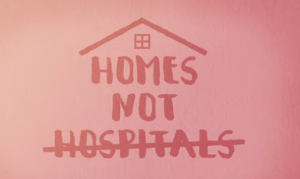More than a decade after Winterboune View, the human rights scandal continues

Published by Professional Social Work magazine, 10 August, 2022
A new bid to reduce the number of people with learning disabilities or autism in hospital has been launched by the government.
The government’s new Building the Right Support (BtRS) Action Plan, launched in July, pledges to halve the number of people inappropriately held in mental health units by March 2024 and offer better quality of care and support for people with learning disabilities and autism.
Additional targeted funding of over £90 million has been promised for 2022 to 2023.
But campaigners have responded with warnings that previous pledges have been kicked into the political long grass.
After shocking abuse was uncovered by BBC's Panorama in 2011 at Winterbourne View Hospital, an inpatient unit for people with learning disabilities, there was widespread condemnation of the fact that too many people with a learning disability, autism, or both are stuck in inpatient settings because of a lack of community support services.
Despite successive government promises, by 2015 autistic people made up 38 per cent of the number in hospital. That figure now stands at 60 per cent. The average length of stay is around five and a half years.
According to the latest Assuring Transformation NHS Digital data:
- 2,005 autistic people and people with learning disabilities are in inpatient mental health hospitals in England
- 1,215 (60 per cen) of these people are autistic
- Around 190 of these are autistic people under 18
A spokesperson for the National Autistic Society said: “After Winterbourne View the government announced the Transforming Care programme which aimed to close up to half of the inpatient mental health beds and move people back to their local communities by 1 June 2014. This did not happen.
“Then, In 2015, NHS England published a three-year closure programme, national plan and service model called Building the Right Support. The aim was to close 35-50 per cent of inpatient beds and develop the right support in communities by March 2019.
“But this is still not the case.
“We know that a lack of the right support means that some autistic people spend many months, even years, in hospitals far from their families, and we continue to hear deeply concerning reports of over-medication, inappropriate restraint and seclusion.
“We welcome the government’s commitment to improve the situation, but it still isn’t enough.
“There simply aren’t enough of the right type of community services, which is a key reason why autistic people are still being admitted to inpatient care and why it’s often so hard for them to move back to the community.”
Rebecca Davis, who has been fighting for four years to get her brother released from hospital where he is “scared and homesick”, said: "It feels like nothing has changed since the Winterbourne View scandal – if anything, things have got a lot worse. People continue to suffer, and I just want my brother to be with us – safe and happy at home and the same for all the other people stuck in ATUs. They deserve better.”
Dan Scorer, head of policy and public affairs at Mencap, warned: "We welcome the government’s agreement to remove the financial disincentives that prevent people being able to get the right support in the community. However, we are yet to see any plan on how to tackle this.
"This is a human rights scandal – we need clear actions, targets and monitoring to develop the right community support, prevent admissions and get people back to their communities."
BASW England launched the Homes Not Hospitals campaign to lobby for urgent action and a spokesperson said: “We met with the Minister of State for Care, Gillian Keegan MP to discuss the Action Plan before its release and to press for assurances that the government understood the challenges and that we would not see action kicked in the long grass, as we have done previously.
“We will continue to engage as we move towards the implementation of the Action Plan.”
